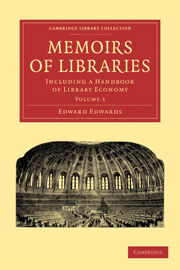Book contents
- Frontmatter
- CHAPTER I RUDIMENTS OF BOOK-COLLECTING; WITH MORE ESPECIAL REFERENCE TO PUBLIC LIBRARIES
- CHAPTER II COPY-TAX
- CHAPTER III GIFTS
- CHAPTER IV PUBLIC HISTORIOGRAPHY AND PUBLIC PRINTING
- CHAPTER V INTERNATIONAL EXCHANGES
- CHAPTER VI PURCHASES
- BOOK II BUILDINGS
- BOOK III CLASSIFICATION AND CATALOGUES
- BOOK IV INTERNAL ORGANIZATION AND PUBLIC SERVICE
- GENERAL INDEX
- Plate section
CHAPTER IV - PUBLIC HISTORIOGRAPHY AND PUBLIC PRINTING
Published online by Cambridge University Press: 05 August 2011
- Frontmatter
- CHAPTER I RUDIMENTS OF BOOK-COLLECTING; WITH MORE ESPECIAL REFERENCE TO PUBLIC LIBRARIES
- CHAPTER II COPY-TAX
- CHAPTER III GIFTS
- CHAPTER IV PUBLIC HISTORIOGRAPHY AND PUBLIC PRINTING
- CHAPTER V INTERNATIONAL EXCHANGES
- CHAPTER VI PURCHASES
- BOOK II BUILDINGS
- BOOK III CLASSIFICATION AND CATALOGUES
- BOOK IV INTERNAL ORGANIZATION AND PUBLIC SERVICE
- GENERAL INDEX
- Plate section
Summary
Albeit that mortal folk are marvellously separated both by land and water, ‥ yet are they and their acts (done peradventure by the space of a thousand years), compacted together by the Historiographer, as it were the deeds of one self-same city, and in one man's life. Wherefore I say that History may well be called a Divine Providence. ..… It is the keeper of such things as have been virtuously done, and the witness of evil deeds. By the benefit of History, all noble, high, and virtuous acts be immortal.
Bourchier, Lord Berners (Preface to Froissart).Mere Parsimony is not Economy, It is separable in theory from it; and, in fact, it may, or it may not, be a part of Economy, according to circumstances. Expence, and great expence, may be an essential part in true Economy. ..… Economy is a distributive virtue, and consists not in saving, but in selection. Parsimony requires no providence, no sagacity, no power of combination, no comparison, no judgement. Mere instinct, and that not an instinct of the noblest kind, may produce this false economy in perfection. The other Economy has larger views. It demands a discriminating judgement, and a firm and sagacious mind.
Burke (Letter to a Noble Lord–Works, viii, 31).- Type
- Chapter
- Information
- Memoirs of LibrariesIncluding a Handbook of Library Economy, pp. 609 - 621Publisher: Cambridge University PressPrint publication year: 2010First published in: 1859

